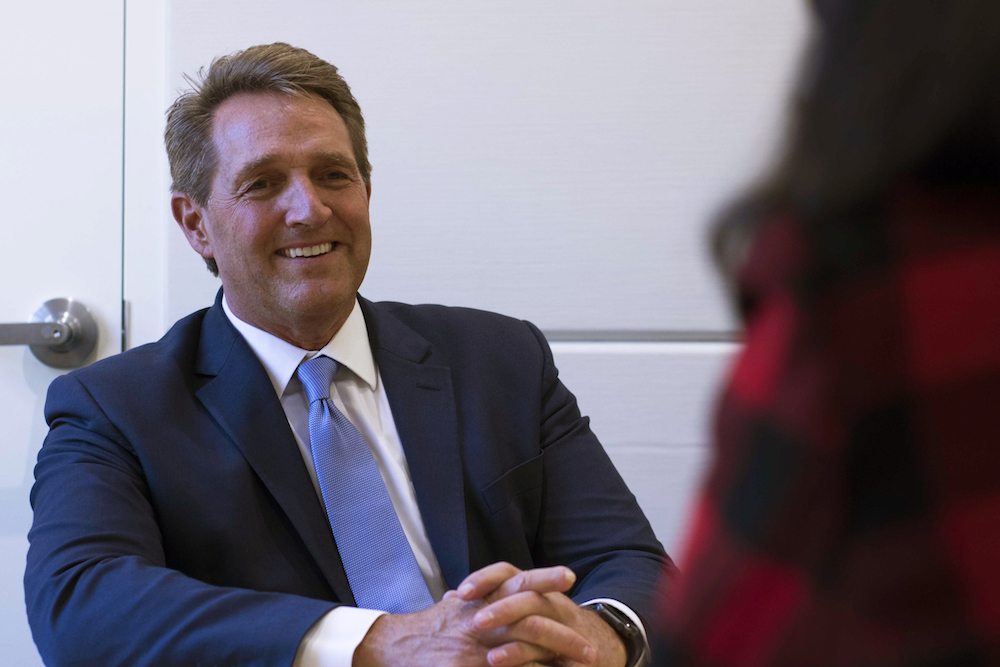
The same day the Senate voted to acquit President Donald Trump of impeachment charges, Feb. 5, former Republican Sen. Jeff Flake of Arizona spoke at Thorne Hall as Occidental’s 2020 Jack Kemp ‘57 Distinguished Lecturer. Alongside Arizona attorney Grant Woods ‘76, Flake discussed the future of conservatism and his vote to confirm Supreme Court Justice Brett Kavanaugh. In the days leading up to the lecture, Chelsea Evans (junior), Cassidy Evans (junior) and Chandler Luebbers-Rivera (junior) put up posters around campus protesting Flake’s vote in the Kavanaugh hearings.
Dean of the College and Vice President for Academic Affairs Wendy Sternberg wrote in a campus-wide email Jan. 24 that Flake’s visit is “both timely and relevant.” The three students printed the email, crossed out Sternberg’s statement and replaced it with “disrespectful to survivors” Jan. 29. They covered the Arthur G. Coons (AGC) building with 29 posters the night of Feb. 3.
“We believe survivors. Jeff Flake doesn’t,” one poster read.
An anonymous response was posted on the AGC Feb. 4 that said people should listen to those with different opinions.
“There is much more to be learned and understood about someone with a different opinion than the everyday liberal groupthink,” the poster read.
Before the lecture, Flake said he had not seen any of the posters protesting him.
Lecture guests were given pieces of paper as they checked in to write down questions for Flake during the Q&A portion of the lecture. About 300 people filled Thorne Hall. Many seats were left empty.
President Jonathan Veitch introduced Flake as a victim of the culture wars. Because of his opposition to Trump, Flake had lost his job as an Arizona senator, Veitch said.
Eduardo Garcia (sophomore) said Veitch’s introduction set the tone for the rest of the lecture.
“What’s the culture war? That your white traditional values are being taken away from you or criticized? That’s not a culture war,” Garcia said. “It’s a critique of who you are and your makeup. If he wants to constantly be a victim for that, I didn’t really agree with that.”

During the Kavanaugh hearings, Flake pushed for an FBI investigation into the accusations against Kavanaugh. A photograph published in 2018 by Time Magazine, titled “Man in the Middle,” shows Flake’s fellow Republican senators hovering around him questioning his reasoning for an FBI investigation. When asked about the photo in an interview with The Occidental before the lecture, Flake said it showed that there is no room for deliberation in politics today.
“Don’t indicate for a second that you might be open to persuasion, or that a hearing you might be chairing might inform your vote, or that an investigation going on might be dispositive somehow,” Flake said. “As soon as you concede that, then all sides go after you and you’re the man in the middle, and there is no constituency there. It’s just a lonely place to be.”
Politics professor Peter Dreier said that Flake tried to be a principled Republican and stand up to Trump, but fell short.
“Jeff Flake has tried to carve out an image for himself as a maverick, a dissenter within the Republican Party,” Dreier said. “But when it really counted, he was as much a puppet of Donald Trump as all the other Republicans in the Senate.”
Questions for the Q&A were not prescreened, according to Jim Tranquada, director of communications and community relations.
“All questions submitted by the audience were sorted into broad categories before they were handed to Grant Woods ’76, the moderator. Mr. Woods then picked the questions he asked Sen. Flake, knowing there wouldn’t be time to get to them all,” Tranquada said via email.
Before starting the Q&A portion, Woods asked Flake his own question about Flake’s deliberation in the Kavanaugh hearings, which he prefaced with a comment about Flake’s history of treatment of issues of sexual assault.
“I know that you are sensitive to and a supporter of survivors’ rights and understand the sexual assault issue, and how we have to protect women and protect their rights,” Woods said.
Flake, who had been at the State of the Union Address the night before, said he was in the same elevator where two sexual assault survivors confronted him.
“It’s the reason I’ve taken the stairs ever since. I have PTSD there,” Flake said.
Spencer Nussbaum (senior) said Flake’s comment did not land well.
“Can you not read the room?” Nussbaum said. “There was no level of self-awareness to what he was saying.”
At the time of the hearings, Flake was three months away from retiring from the Senate. Flake said he would not vote against Kavanaugh as a way to spite Trump.
“I didn’t think it was right to dismiss someone out of animosity to the president. I tried to weigh it all and I felt you couldn’t set a precedent where an allegation, no matter how old, would be enough in itself to disqualify someone from serving,” Flake said.

Rachel Winningham (senior) attended a small group discussion with Flake before the lecture. As a politics major, Winningham said she understands that a Republican White House will nominate a conservative judge, but she questions their decision to nominate Kavanaugh.
“They didn’t have to nominate that conservative judge. There’s hundreds that they could have,” Winningham said. “This hearing was tearing up the country, and really, truly traumatizing to a lot of people, and they still pursued it. It was very clearly a political message in my eyes.”
In an interview before the lecture, Flake said the Senate Judiciary Committee did not confirm every one of Trump’s judicial nominees. He said, for example, he blocked the appointment of Thomas Farr to be a U.S. district judge in North Carolina.
“I voted against a few judges that — particularly the one named Farr, who was one of Jesse Helms’ legal aides — who I felt that had a troubling past,” Flake said.
Garcia said the lack of open discussion at the lecture did not allow for audience members to ask for clarification on things Flake said.
“It was kind of playing to Jeff’s ego, in the way that ‘I’m this good guy and I wouldn’t go against my morals,’ and it’s like, ‘Well, what are your morals?'” Garcia said. “He never really explicitly stated that. I went to learn about the other side, if you want to call it that, but it seemed like there was no introduction of our side or of the contradictions to what you’re saying.”
Ethan Reznik (senior) said while he disagreed with Flake, Flake’s presence is good for public discourse. Winningham said that the lecture series has potential, but the format does not allow students to engage with issues.
“I think it’s ridiculous that the administration is inviting a conservative speaker, and then shielding them from like any kind of sincere interaction with the students,” Winningham said. “You’re pretending to have a conservative speaker basically for the alumni.”
![]()


































